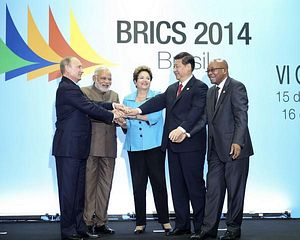The leaders of Brazil, Russia, India, China and South Africa (otherwise known as the BRICS) launched a development bank on Tuesday. The BRICS grouping represents a set of five large emerging economies that represent a fifth of the world economy and 40 percent of the global population between them. The leaders met in Fortaleza, Brazil at the sixth annual BRICS Summit.
The bank’s official name will be the New Development Bank, a name suggested by Indian Prime Minister Narendra Modi. The bank will have an initial capital pool of $50 billion and maintain a currency reserve of $100 billion. The burden for the bank’s initial capital pool will be divided equally between all five nations to ensure an equal stake in the bank. The bank’s goal is, in part, to challenge the dominance of the World Bank and the International Monetary Fund (IMF), two dominant and primarily Western international institutions. The bank will be physically located in Shanghai, China, and its first president will come from India.
The issue of the bank’s physical location and leadership caused somewhat of a stir between the two BRICS giants, India and China. Indian analysts fear that the bank may end up under a disproportionate amount of Chinese influence, not merely due to its physical location but also because China may end up providing the financing for the $10 billion tranches that Brazil and South Africa will need to contribute to the bank. One Indian analyst, Mihir Sharma, argues that the bank represents an economic and strategic blunder for India which will never benefit enough either economically or strategically from the existence of the bank to justify the costs of participation.
Chinese observers are far more sanguine about the bank’s existence. A Global Times op-ed, titled “BRICS bank helps stabilize global order,” notes that the creation of this bank will help emerging economies stake out their interests in the global financial system. It also cites the creation of the bank as an instance of China taking on a global leadership role: ” Western countries have been asking new emerging countries, including China, to take more international responsibilities. The biggest problem facing the international community is development.”
Rhetoric from BRICS leaders on the bank’s creation suggests in earnest that the New Development Bank will be charged with mitigating the negative consequences that might come to these emerging economies following an interest rate increase in the United States, for example. The $100 billion of currency reserves could additionally help thwart a balance of payments crisis. The bank certainly represents the ambitions of the world’s rising powers to proffer an alternative to the institutions borne of Bretton Woods. On one level, that the New Development Bank is necessary demonstrates the extent to which these rising powers have felt excluded from the existing global order. It remains to be seen if this ambition can be realized in a sustainable and productive way.

































